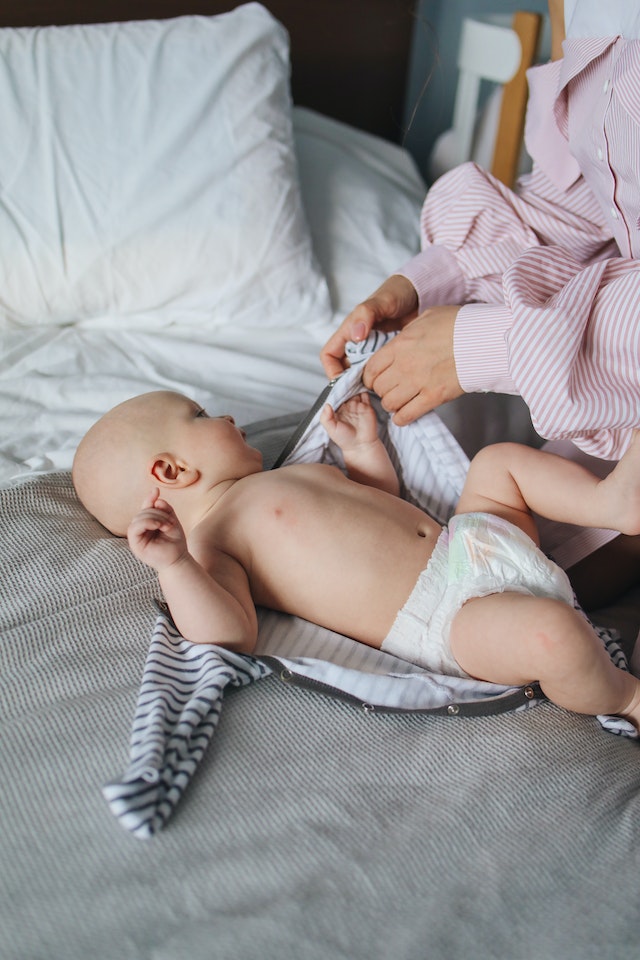Introduction
As a parent, one of the essential responsibilities you have is ensuring the comfort and hygiene of your little one. Diapers play a crucial role in keeping your baby dry and protected.
However, many new parents often wonder, “How often should I change my baby’s diaper?”
In this article, we will address this common concern and provide valuable insights into the frequency of diaper changes, along with the importance of using diapers.
Why Use Diapers?
Before delving into the topic of how often to change diapers, let’s first understand why diapers are an integral part of your baby’s daily routine.
Moisture Absorption:
Diapers are designed to absorb and lock away moisture, keeping your baby’s skin dry and comfortable. This feature helps prevent diaper rash and skin irritations caused by prolonged exposure to wetness.
Hygiene:
Diapers prevent leaks and accidents, reducing the risk of bacterial or fungal infections. They act as a protective barrier, keeping your baby’s sensitive areas clean and safe from external contaminants.
Convenience:
Using diapers simplifies the process of handling your baby’s waste. They are easy to put on, remove, and dispose of, saving you time and effort.
When to Change Diaper:
A General Guideline Every baby is unique, and their diaper change requirements may vary.
However, the following guidelines can serve as a helpful starting point:
Newborns (0-3 months):
Newborn babies tend to have more frequent bowel movements, often passing stools after each feeding.
It is recommended to check their diaper every two to three hours or whenever you suspect a bowel movement or wetness.
Remember to change the diaper promptly after each soiling to maintain cleanliness and prevent discomfort.
Infants (3-6 months):
As your baby grows, their bladder capacity increases, and bowel movements may become less frequent.
Typically, changing diapers every three to four hours or as soon as you notice wetness is sufficient.
Keep an eye out for signs of discomfort or a heavy diaper, indicating the need for a change.
Older Babies (6+ months):
By this stage, your baby’s bladder control improves, and their bowel movements become more regular.
Changing diapers every four to six hours or whenever necessary should be adequate.
Be attentive to your baby’s cues, such as fussiness or pulling at their diaper, as these could indicate the need for a change.
Additional Factors to Consider
While the general guidelines mentioned above provide a good starting point, it’s crucial to consider a few additional factors that can influence diaper change frequency:
Diaper Type:
The type of diaper you use may affect the absorption capacity and the duration it remains dry.
High-quality diapers tend to provide better moisture-wicking capabilities, allowing for more extended periods between changes.
Diaper Size:
As your baby grows, they will require larger-sized diapers to accommodate their increasing needs.
Using the correct size ensures a proper fit, minimizing the chances of leaks and discomfort.
Climate and Temperature:
Hot and humid weather may lead to increased perspiration, making it necessary to change diapers more frequently.
Similarly, during colder months, babies may urinate less frequently, allowing for longer intervals between changes.
Conclusion
Maintaining your baby’s comfort and hygiene is of utmost importance, and proper diaper usage plays a significant role in achieving this goal.
By adhering to the general guidelines mentioned above and staying attuned to your baby’s cues, you can determine when to change your baby’s diaper effectively.
Remember to prioritize your baby’s well-being and choose diapers that offer optimal absorption and fit.
By doing so, you’ll ensure your little one stays dry, clean, and happy throughout their early years.


